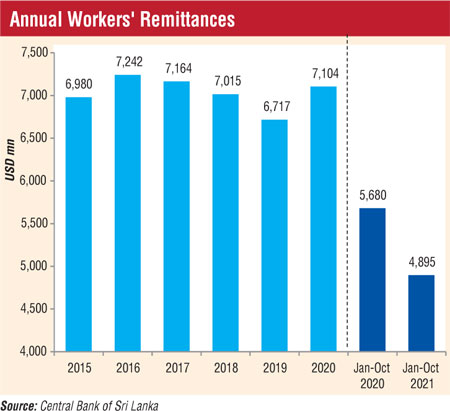Monday Feb 16, 2026
Monday Feb 16, 2026
Wednesday, 1 December 2021 00:29 - - {{hitsCtrl.values.hits}}
 The Central Bank (CBSL) on Thursday expressed confidence of workers remittances rebounding with the rollout of multiple initiatives.
The Central Bank (CBSL) on Thursday expressed confidence of workers remittances rebounding with the rollout of multiple initiatives.
The optimism also stems from the fact that more people are now taking off for overseas jobs, after pandemic-induced travel restrictions had kept them grounded in Sri Lanka over past year.
The Central Bank said that around 230,000 people migrate for employment annually and, with the easing of travel restrictions post-vaccination, a higher number were queuing up to take up overseas jobs.
The rush to return is also evident from those who evacuated in the early days of the pandemic from their country of work.
“This is the pent-up demand. We have had discussions with the Department of Immigration and Emigration to clear the backlog in issuing passports as well,” CBSL Governor Nivard Cabraal told journalists. “There are plans to offer insurance as well as pensions to migrant workers.”
Despite recording over $ 500 million per month consecutively from June 2020 till April 2021, workers’ remittances moderated in recent months. This led to workers’ remittances in the first 10 months of 2021 declining by 14% to $ 4.9 billion from the corresponding period of last year. Inflows in October more than halved to $ 317 million (lowest in recent years) from $ 630.7 million a year ago. The forecast is for full year 2021 inflows to be lower than last year’s $ 7.1 billion.
The large exchange rate anomaly between official and unofficial channels until October, which drove drives foreign exchange earners to use unofficial channels, and the dwindling number of departures were cited as major contributing factors for the decline.
According to the CBSL, workers’ remittances had been a key pillar of Sri Lanka’s foreign currency earnings that had nearly 100% of domestic value addition, providing a substantial cushion for external sector resilience of the country.
Workers’ remittances have covered around 80% of the annual trade deficit over the past two decades and strengthening remittance inflows into the country brings several socio-economic benefits, including the smooth supply of forex inflows to the formal banking system and the reduction of income and regional disparities.
The Central Bank said that part of the recent drop was due to migrant workers using grey channels, known as the Hawala system, to remit funds in a bid to garner a higher exchange rate especially after the CBSL put a cap of Rs. 203 to the dollar, whilst, given the shortage of foreign exchange, the grey market fetches a premium both in buying and selling.
In recent months the CBSL has stepped up measures to address this, as well as increase facilitation of workers remittances. Recently it established a new department named the Foreign Remittances Facilitation Department (FRFD) to facilitate and streamline workers’ remittances inflows to the country, under the provisions of the Monetary Law Act No. 58 of 1949.
The CBSL also appointed a working committee to study and suggest new remittance channels for Sri Lanka and to make recommendations on reducing the cost of remitting money, having identified the need to introduce new and low-cost remittance channels with the objective of increasing the inflows of foreign remittances while discouraging the use of informal channels.
The working committee comprises experienced professionals from Bank of Ceylon, People’s Bank, Sampath Bank PLC, Commercial Bank of Ceylon PLC, Hatton National Bank PLC, The Hongkong and Shanghai Banking Corporation Ltd., Cargills Bank Ltd., Dialog Axiata PLC, Mobitel Ltd., and CBSL.
The working committee has proposed the implementation of a national remittance mobile application titled ‘SL-Remit’ to attract more remittances to Sri Lanka with features such as user self-registration, the ability to link to global money transfer operators, and global fintechs to facilitate remittances from any country, and instant fund transfers to any bank account or mobile wallet in Sri Lanka.
In addition, the application would include value-added services, such as direct bill payments, attractive foreign exchange rates, and low transaction fees.
CBSL said it will now implement the ‘SL-Remit’ mobile application with the assistance of stakeholders, including the Ministry of Finance, Ministry of Foreign Affairs, Sri Lanka Banks’ Association, Sri Lanka Bureau of Foreign Employment, and LankaClear Ltd.